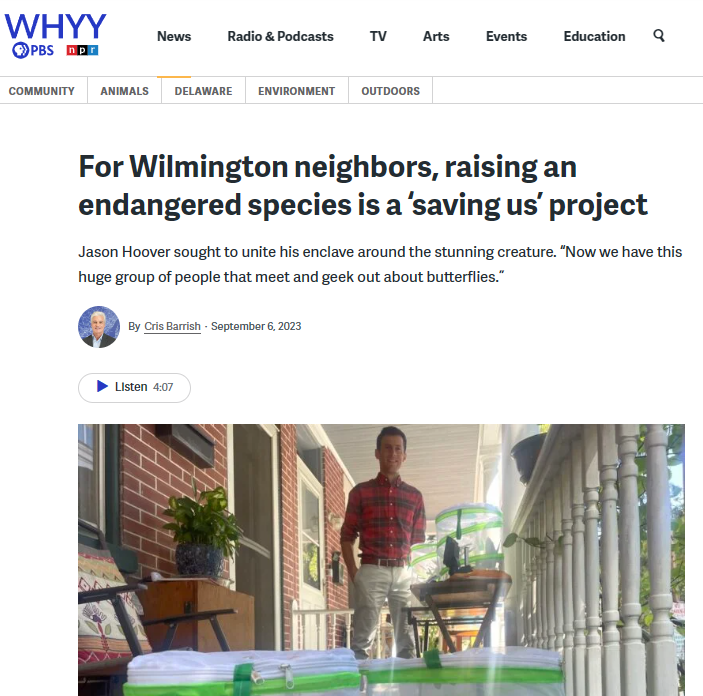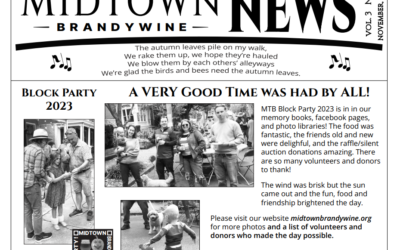Midtown Brandywine resident, Jason Hoover, has passionately spearheaded the Midtown Monarch Monitors butterfly program, establishing an enthusiastic community around these beautiful creatures in a single season. Aside from his butterfly endeavors, Jason is the proprietor of the renowned digital marketing and website firm, Trolley Web. Although web development was never in his initial plans, he found joy in aiding businesses and nonprofits in Delaware, thereby deepening his connection to his community. Jason’s commitment to bolstering the ambitions of ordinary individuals trying to achieve commendable objectives is commendable.
We caught up with Jason to discuss the achievements of the 2023 Midtown Monarchs program and to look ahead to 2024.
Midtown Brandywine News: “What inspired you to focus on monarch butterflies? With the myriad of fascinating insects available, why do monarchs hold such a special place in this project?”
 Jason Hoover: “While the project revolves around monarchs, it’s not exclusively about them. Monarchs are undeniably magnificent. Their distinct appearance and awe-inspiring migration from the U.S. and Canada to Mexico are unparalleled. But beyond their beauty and fascinating life cycle, there’s an alarming concern: their declining numbers. In the past 30 years, their population has dwindled to just 20% of its original size. You know, Monarchs are exclusive to North America.
Jason Hoover: “While the project revolves around monarchs, it’s not exclusively about them. Monarchs are undeniably magnificent. Their distinct appearance and awe-inspiring migration from the U.S. and Canada to Mexico are unparalleled. But beyond their beauty and fascinating life cycle, there’s an alarming concern: their declining numbers. In the past 30 years, their population has dwindled to just 20% of its original size. You know, Monarchs are exclusive to North America.
“What captures my interest is that, like countless other insects, monarchs play a crucial role in our ecosystem. Although people often find bugs repulsive, the monarchs serve as a captivating introduction to the entomological world. Their transformation from eggs, through several caterpillar stages, and into butterflies is mesmerizing. And this metamorphosis isn’t unique to them; it’s a phenomenon that many insects undergo. Monarchs specifically, with their dietary restriction to milkweed due to a unique co-evolution, shed light on the intricate relationships within our ecosystem and emphasize the importance of supporting it.”
Midtown Brandywine News: “Given the milkweed’s co-evolution with the monarch, is it correct to assume milkweed is native to America?”
Jason Hoover: “Yep, most milkweeds are native to America, although there are some exceptions like the tropical milkweed. Promoting the monarch program has inspired many of our neighbors to plant milkweed in their gardens.”
Midtown Brandywine News: “Has this milkweed initiative sparked an interest in native plantings in the neighborhood?”
Jason Hoover: “Absolutely, yes. Planting milkweed has been a steppingstone to recognizing the significance of native plants in preserving the balance of our ecosystem. While we often plant based on aesthetics or to deter pests, it’s essential to appreciate the role of insects in the food chain. They’re the foundation. Birds, for example, rely on bugs. It’s all interconnected.
“For me, one of the project’s crowning achievements is its ability to bring the community together. Through the monarchs, I’ve connected with numerous neighbors. It’s intriguing how this butterfly, which spans three countries during its migration, can bridge community divides. Interestingly, it’s not one monarch traveling from Mexico to Canada but a multi-generational voyage, which is so perplexing and enchanting.”
Midtown Brandywine News: “Were all the Midtown Monarchs tagged before their release?”
Jason Hoover: “No, only the fourth generation, which is called the ‘super generation’, gets tagged. We collaborate with MonarchWatch.org, which based on our latitude, suggests the ideal time to commence tagging. We began around the end of August, so any monarchs raised before weren’t tagged.”
Midtown Brandywine News: “Can you tell us about your kit?”
Jason Hoover: “We priced the kit at $10, to simply cover our costs. It includes a large mesh cage, which we buy in bulk, hence the pretty cheap pricing. The kit also contains a stand for milkweed. Participants insert a fresh cutting into water to sustain it for about a week. However, it’s essential to avoid open water as the caterpillars, being really clumsy, could fall and drown. Our solution is a dollar store Tupperware with drilled holes filled with water, which seems more effective than our initial floral vase setup. The kit also comes with a spray bottle for a 5% bleach solution. This helps disinfect the milkweed, protecting the caterpillars from diseases and parasites, like energy-sapping protozoa. Essentially, disinfecting the milkweed before offering it to the caterpillar is crucial.”
Midtown Brandywine News: “Can our monarchs be raised indoors?”
Jason Hoover: “It’s preferable to raise them outdoors as their metabolic rates depend on the temperature. An enclosed porch is ideal. If indoors, place them in a warmer room, avoiding direct air vents. In nature, their survival rate is merely 5%. They’re defenseless against threats like birds, spiders, and even beneficial insects. By raising them inside, we raise their survival rate to 95%, mainly by safeguarding them from predators. Many in our community have even begun naming their monarchs before releasing them.”
Midtown Brandywine News: “Tell us about the community’s response and the atmosphere during these butterfly releases.”
Jason Hoover: “The experience has been heartwarming. We have a Telegram app group where participants communicate, sharing successes and seeking assistance. The camaraderie during monarch releases, both spontaneous and planned, is infectious. Photos captured show people with pure, childlike delight on their faces, possibly because of the effort they’ve invested in nurturing these butterflies and the awe of witnessing their metamorphosis. This endeavor has introduced many to a species they’d previously overlooked.”
Midtown Brandywine News: “Looking ahead, how will the 2024 season differ from 2023?”
Jason Hoover: “In 2024, our aim is greater diversity among participants to foster community bonding. While our efforts in raising monarchs may seem minuscule on a global scale, our broader goal is habitat restoration. We want people to plant more milkweed, vital for monarchs’ survival, considering the rapid habitat degradation. Encouraging more neighborhoods to adopt this approach can magnify the impact. It’s about altering perceptions and understanding our role in this ecosystem.”
Midtown Brandywine News: “When should one start preparations for the 2024 season?”
Jason Hoover: “It’s never too early to plant milkweed, a perennial. In its first year, it’s too small to benefit monarchs. By the second year, it matures significantly. Therefore, those intending to participate next year should consider planting milkweed soon.”
Midtown Brandywine News: “I want to ask you how it felt to hear this fantastic news segment about the Midtown Monarch Monitors on Philadelphia’s NPR station, WHYY in August, then to see the story on the front page of their website?”
Jason Hoover: “My God, like, it’s cool because, you know, I think I think it highlights that the work goes beyond just the butterflies. I mean, it makes me feel good. I’m glad that I’m spreading the curiosity.”
Midtown Brandywine News thanks Jason Hoover, who also generously serves on the board of the Midtown Brandywine Neighbors’ Association, for all he does for our neighborhood.











